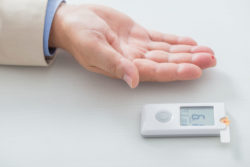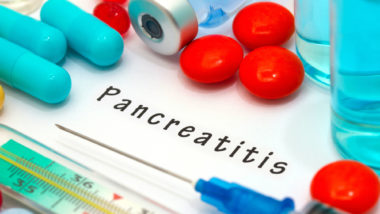 Certain diabetes medications including Steglujan may increase the risk of genital infections by a flesh eating bacteria, according to recent FDA warnings.
Certain diabetes medications including Steglujan may increase the risk of genital infections by a flesh eating bacteria, according to recent FDA warnings.
In August 2018, the U.S. Food and Drug Administration (FDA) alerted the public that a certain class of diabetes medication known as SGLT2 inhibitors have been linked with 12 cases of Fournier’s gangrene, a genital infection caused by a flesh eating bacteria.
Following the reports of Fournier’s gangrene caused by flesh eating bacteria, the FDA is requiring new warnings to be added to the drug’s label and patient medication guide.
Fournier’s gangrene is an extremely rare disease that occurs when flesh eating bacteria enter the genitals through a cut or break in the skin. Once the bacteria enter the body, they spread very quickly and can cause irreversible damage to the infected tissue. Signs of Fournier’s gangrene including fever, pain, swelling and an unpleasant smell from the infected area.
According to the FDA alert, 12 cases of Fournier’s gangrene in SGLT2 inhibitor patients have been reported to the agency between March 2013 and May 2018. Five of the cases were found in women while the other seven were found in men.
All 12 patients were hospitalized and needed surgery for the infection by the flesh eating bacteria. Five of the patients required multiple surgeries, one patient needed skin grafting, and two have been transferred for further treatment at rehabilitation hospitals.
Unfortunately, complications resulted in death in one of the 12 cases.
Treatment for Fournier’s gangrene includes intravenous antibiotic treatment and the removal of the dead tissue. Multiple surgeries may be necessary to remove the affected tissue and reconstruct from the damage. However, the complications from the disease can become fatal, with an estimated 20 to 40 percent of Fournier’s gangrene patients dying from complications.
The disease is far more common in men, with the National Organization for Rare Disease reporting that Fournier’s gangrene is five to ten times more likely to occur in men than in women.
However, the occurrence of the flesh eating bacteria infection is still rare. A 2009 study in the Journal of Urology found that Fournier’s gangrene occurs in 1.6 out of 100,000 males in the United States.
The flesh eating bacteria disease is far more common in individuals with a weakened immune system from conditions including diabetes, obesity, and cirrhosis.
The class of diabetes drugs, known as SGLT2 inhibitors, were first released on the market in 2013. Drugs in this class include: Invokana, Invokamet, Invokamet XR, Farxiga, Xigduo XR, Qtern, Jardiance, Glyxambi, Synjardy, Synjardy XR, Steglatro, Segluromet and Steglujan.
The FDA encourages patients taking Steglujan and other SGLT2 inhibitors to be vigilant of their health and seek medical attention at the first sign of infection. The flesh eating bacteria works quickly to destroy tissues, blood vessels and nerves, so prompt medical attention is essential.
However, the agency also encourages patients to not stop taking their medication without speaking to a doctor. Although a flesh eating bacteria infection is a terrifying prospect, untreated diabetes may leave patients open for other risks.
Join a Free Diabetes Medications & Flesh-Eating Infection Lawsuit Investigation
The type-2 diabetes medications linked to the flesh-eating infection include:
- Invokana
- Invokamet/Invokamet XR
- Farxiga
- Xigduo XR
- Qtern
- Jardiance
- Glyxambi
- Synjardy/Synjardy XR
- Steglato
- Segluromet
- Steglujan
If you or a loved one took one of the type-2 diabetes medications listed above and suffered from a flesh-eating genital infection, you may qualify to join this diabetes medication lawsuit investigation. Fill out the FREE form on this page for more information.
ATTORNEY ADVERTISING
Top Class Actions is a Proud Member of the American Bar Association
LEGAL INFORMATION IS NOT LEGAL ADVICE
Top Class Actions Legal Statement
©2008 – 2025 Top Class Actions® LLC
Various Trademarks held by their respective owners
This website is not intended for viewing or usage by European Union citizens.
Get Help – It’s Free
Join a Free Diabetes Medications & Flesh-Eating Infection Lawsuit Investigation
If you qualify, an attorney will contact you to discuss the details of your potential case at no charge to you.
PLEASE NOTE: If you want to participate in this investigation, it is imperative that you reply to the law firm if they call or email you. Failing to do so may result in you not getting signed up as a client or getting you dropped as a client.
E-mail any problems with this form to:
[email protected].
Oops! We could not locate your form.












